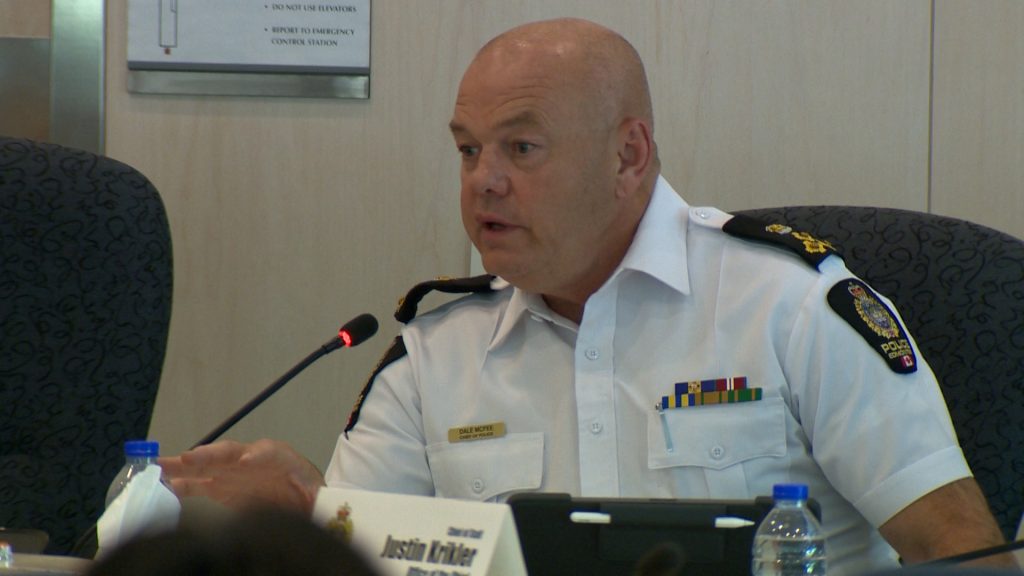Edmonton police attempt to clarify confusion involving man accused in Chinatown homicides

The daughter of one of the two men killed in Edmonton’s Chinatown last month says she’s still waiting for answers around the circumstances leading up to her father’s death.
BACKGROUND: Man in custody, charged following two deaths in Chinatown on Wednesday
Christina Trang told reporters Thursday at Edmonton’s police commission she’s in survival mode, and that her family is confused how the man charged in her father’s death was released in Edmonton by RCMP – against parole conditions – before the homicides.
Advertisement
Court records show Justin Bone was released from remand on April 26 and bail conditions required to stay at an Alberta Beach residence.
However, Alberta RCMP confirm that on May 15, after responding to a complaint of threats, they learned Bone was no longer welcome at that home.
After failed attempts to make contact with his probation officer, Parkland RCMP decided to drop Bone off in Edmonton near social services.
Three days later, on May 18, Bone was arrested and charged with two counts of second-degree murder in the beating deaths of 61-year-old Ban Phuc Hoang and 64-year-old Hung Trang.
Edmonton police Chief Dale McFee clarified their involvement Thursday while walking back a previous statement made to the press.
Advertisement
“The EPS statement to the media incorrectly stated that officers had an interaction with the accused,” McFee told the commission. “When it fact, the only contact EPS had was with the complainant who resided with Mr. Bone.”
RELATED:
- Province demanded plan: Edmonton mayor to speak on curbing crime in city’s downtown
- Concerns for Edmonton’s homeless population as city, province address rise in violent crime
- Edmonton council explores solution to increase downtown safety after Shandro invokes Police Act
Chief Mcfee says police were informed by RCMP that Bone would be dropped off in the city, possibly near the Hope Mission or the shelter district, and that this would be against his bail conditions.
EPS are unsure why Bone was dropped off in west Edmonton, near 156 Street and Stony Plain Road.
McFee also clarified that even if EPS had had contact with Bone in the three days he was in Edmonton before the homicides, they would not have been able to lay charges on bail breaches.
Advertisement
“When the RCMP granted permission for Bone to be in Edmonton, the EPS lost any ability to breach Mr. Bone for being in Edmonton,” said McFee.
An internal review by the RCMP is expected to look at:
- the decisions officers made;
- the operational policies and procedures currently in place that guide decisions like these;
- any gaps in support systems;
- and how RCMP coordinate responses with partner agencies when there are a multitude of social and judicial factors involved.
For Trang, she says these reviews are important for her family’s grieving process.
“It’s important for us to know what happened to our dad, we need those answers,” she said.
She’s also questioning comments made by Justice Minister Tyler Shandro, who claimed Bone had access to an addiction treatment centre with no waitlist.
Advertisement
“It’s important for us to know, if there was a bed available in a statement made by Tyler Shandro, then where was this facility, what bed was available and why wasn’t he taken there?” said Trang.
READ MORE:
- ‘A wound in our city’: Edmonton’s Chinatown community in mourning, demanding change
- Families of murdered Chinatown victims urge Edmonton city council to act
In a statement to CityNews, an Alberta Justice spokesperson said: “It would be inappropriate to comment in detail until after the reviews have been completed and the Deputy Minister has recommended next steps to the Minister.”
Chief McFee said Thursday there would be no EPS review of the situation surrounding Bone being dropped off, because EPS had no interaction with him. However they will be reviewing how an incorrect statement was made to the media.
“Now we still have to look at how a mistake was made, but other than that we had minimal involvement,” said McFee. “It doesn’t mean that the communication with the RCMP, once we get that report, that we shouldn’t make improvements. That is something we will look at.”